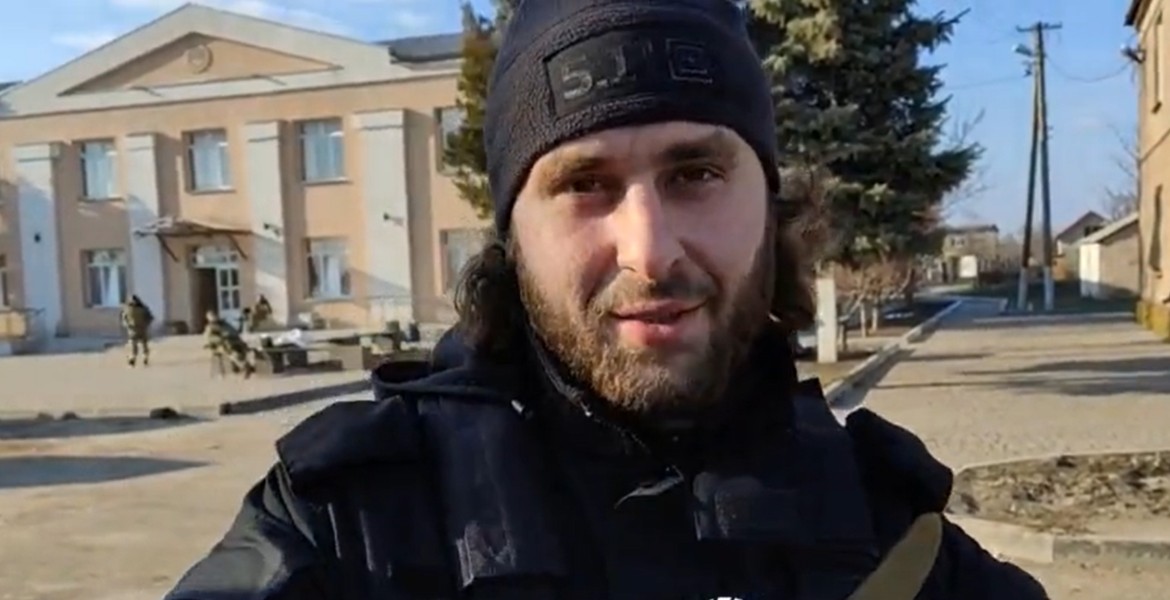An ethnic Greek soldier in the Russian Army explained the reason why he was currently in Sartana, a town on the outskirts of Mariupol in Ukraine's east that was recently captured from Ukraine's neo-Nazi Azov Battalion.
A reporter for RIA asked the soldier: Are you really Greek?
Soldier: Yes, indeed I am.
Reporter: Do you know that you're in a Greek settlement now?
Soldier: Not only do I know this, but it's one of the main reasons I actively pursued to be deployed here... we're here to help and defend both our great and small mother nations [Editor: a likely reference to Russia and Greece].
Reporter: Are you here as part of a group?
Soldier: Yes, we have already completed a part of our mission, just reaching this place. Thank you for the warm welcome and I wish us all good luck.
https://twitter.com/200_zoka/status/1504095994748801027
On March 2, the military chief of the Russian-backed Donetsk People’s Republic, Denis Pushilin, announced that Sartana was captured from the Ukrainian neo-Nazi Azov Brigade who controlled the town since 2014 when a ceasefire was reached.
The Mariupol-based Azov Battalion, a neo-Nazi unit of the Ukrainian Republican Guard, which falls under the command of the Interior Ministry, discriminated, persecuted and tortured non-Ukrainian speakers, including Greeks.
Only days before Russian troops started crossing into Ukraine, the Azov militants killed an ethnic Greek and shot another two only for speaking Russian.
Mariupol and its surrounding area, including the town of Sartana, is home to 120,000 ethnic Greeks.
After the capture of Sartana, Russian media spoke to an ethnic Greek who said: “As soon as the Russians came here, they immediately brought us help. Right now, immediately after the shootings stopped."
“Now no one asks us if you are Ukrainian or Greek, about your origin, what language you speak,” they said.
“The Russians do not discriminate,” they continued, adding: “While the Ukrainians did, they forced us to speak only Ukrainian, although I do not know it at all.”
READ MORE: Greeks in Mariupol: “The Russians help us and don’t discriminate like the Ukrainians” (VIDEO)
The Azov Special Operations Detachment (Ukrainian: Окремий загін спеціального призначення «Азов»), or Azov Battalion, is a right-wing extremist and neo-Nazi unit of the National Guard of Ukraine, based in Mariupol, in the Azov Sea coastal region.
In 2014, the regiment gained notoriety after allegations emerged of torture and war crimes, as well as neo-Nazi sympathies and usage of associated symbols by the regiment itself, as seen in their logo featuring the Wolfsangel, one of the original symbols used by the 2nd SS Panzer Division Das Reich.
Representatives of the group say that the symbol is an abbreviation for the slogan Ідея Нації (Ukrainian for “National Idea”) and deny connection with Nazism.
Meanwhile, an ethnic Greek from the Russian city of Yessentuki in Stavropol Krai was killed fighting in Ukraine.
Born on January 19, 1995, Georgy Romanov was killed on the fourth day of Russia’s military operation in Ukraine, specifically on February 28.
READ MORE: Ethnic Greek fighter in Russian Army killed fighting in Ukraine.
Elsewhere, the Greek Consul General in Mariupol, Manolis Androulakis, reached the city of Zaporizhzhia in south-eastern Ukraine on Wednesday according to diplomatic sources available to Kathimerini. He will spend the night in the city as there is an ongoing curfew.
The operation to evacuate Androulakis, the last diplomatic official of a European Union member-state in the city, has been underway since Tuesday afternoon. He is travelling alongside members from the local Organization for Security and Co-operation in Europe (OSCE) office.
This was the result of efforts by Foreign Minister Nikos Dendias who communicated with the leadership of the OSCE, the Red Cross, officials from the Vatican, and representatives from both Russia and Ukraine, to include Androulakis in a multinational convoy that includes over 30 people.
READ MORE: Russian Greeks provide humanitarian aid to the Greeks of Sartana (Mariupol)

